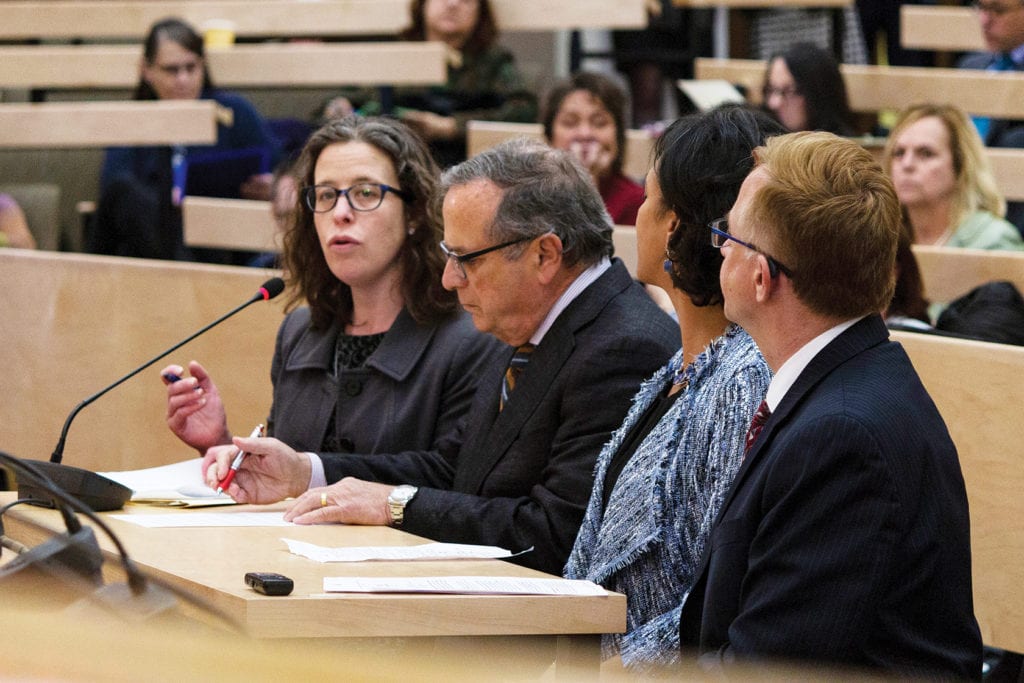Advocates blast gov’s housing bill
Baker’s bill aired at State House hearing

Housing advocates came to the Massachusetts State House for a hearing Tuesday morning to speak against a bill that Governor Charlie Baker says will create more housing in the state.
“Let’s be specific: we have a displacement crisis and an affordable housing crisis,” said Darnell Johnson, regional coordinator for Right to the City Boston. “Calling it a ‘housing crisis’ obscures the underlying issue and leads us to think that building more housing — even vast amounts of market-rate, luxury housing — is the solution. Baker’s bill will lead to just that, ignoring the needs of working families.”
The Housing Choice Initiative, first proposed by Baker in 2017, gives capital to communities across the state that are building new housing in an attempt to create 135,000 new housing units by 2025. Since then, the program has given out $5 million in capital, and designated 69 cities and towns as “Housing Choice Communities.”
The new bill, filed in February after it failed to pass in the last legislative session, would further the Housing Choice Initiative program by giving cities and towns the option to adopt new zoning codes related to housing development by a simple majority vote, instead of a two-thirds majority as is currently required.
Examples of suggested zoning changes include building mixed-use, multi-family and starter homes in town centers and near transit, allowing the creation of accessory dwelling units and granting increased housing density through a special permit process. Communities would not be required to make these zoning changes, but would be encouraged to do so according to the Baker administration’s best-practice guidelines.
“Today, we have more people working in Massachusetts than at any time in our Commonwealth’s history, and the need for substantially increased housing production — for residents across the income spectrum — is necessary to match Massachusetts’ booming economic growth,” Baker said at the time the bill was filed. “This legislation is critical, will unlock the potential of our cities and towns committed to responsible growth, development and enacting best practices in sustainable housing production.”
Activists, however, say that the bill will not create affordable housing, but rather will encourage towns to build more market-rate and luxury housing that will not be accessible to the residents that need it most.
“Requiring every municipality to provide an area where multi-family housing can be built is important because we know that more than half of the multi-family units permitted over the last five years were in just five cities and towns, and more than half of the cities and towns in Massachusetts did not permit any multi-family housing in the last decade,” said Chris Norris, executive director of Metro Housing Boston, in his testimony at Tuesday’s hearing. “Despite the best of intentions, incentives alone are not sufficient to produce affordable housing, let alone housing for the 250,000 extremely low-income households who are spending more than half their income on rent.”
Members of the Baker administration dispute this, saying that if the bill is passed, it does not stop them from creating other legislation to specifically promote affordable housing.
“Every year that goes by without enactment of the Housing Choice bill means that good housing proposals with majority support are defeated because they fail to achieve a two-thirds vote,” said Clark Zeigler, executive director of the Massachusetts Housing Partnership. “If the Legislature enacts Housing Choice and it goes into effect tomorrow, we will be up here advocating for additional measures to zone for additional affordable housing.”
Norris and other advocates want additional components to be included with the bill, to ensure that the zoning changes encourage specifically affordable housing.
“Building affordable housing is like putting together a puzzle,” said Rachel Heller, CEO of the Citizens’ Housing and Planning Association. “You need the zoning in place, funding and support.”






